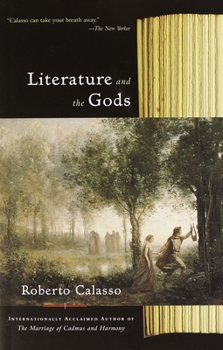Literature and the Gods
Select Format
Select Condition 
Book Overview
Brilliant, inspired, and gloriously erudite, Literature and the Gods is the culmination of Roberto Calasso's lifelong study of the gods in the human imagination. By uncovering the divine whisper that lies behind the best poetry and prose from across the centuries, Calasso gives us a renewed sense of the mystery and enchantment of great literature. From the banishment of the classical divinities during the Age of Reason to their emancipation by the...
Format:Paperback
Language:English
ISBN:0375725431
ISBN13:9780375725432
Release Date:June 2002
Publisher:Vintage
Length:224 Pages
Weight:0.53 lbs.
Dimensions:0.6" x 5.2" x 8.0"
Customer Reviews
2 ratings
Not an easy read, but full of unique insights
Published by Thriftbooks.com User , 20 years ago
This relatively short book is actually 8 lectures Roberto Calasso delivered at Yale in 2000. I found Calasso's book The Marraige of Cadmus and Harmony to be exceptional. I found two others; The Ruin of Kasch and Ka to be more difficult. These lectures are not as accessible as The Marriage of Cadmus and Harmony but neither are they as difficult as Ka, with it's convoluted explanations of Hinduism. Calasso sees the gods as the energy behind creative thought and thus only a few lucky individuals, with blank brains, are visited by the gods. The human mind is not strong enough to bear the full revelation, but we are able to briefly receive the images offered to us by the gods and struggle to give them shape. Calasso seems to think that contemporary thought has diminished the god's powers. Yet he knows they are still among us, and have even been joined by a vast herd of Eastern dieties, ready to invade the European mind. Calasso refutes Voltaire's assertion that the gods are only fables designed by the power hungry priestly class to control the masses. Calasso sees myths as archtypes, patterns, that reveal themselves to men rather than as imply stories invented by men. With sadness, he points out that for a period of 400 years they remained alive mainly in the paintings of Boticelli, Rembrandt, Poussin, and Tiepolo. The gods not only permeate the arts, Calasso points out that it is myth that holds a people together in community. This attests to myths enduring power over us as a society. As Nymphs, the gods survived in the visual arts and emerge in such modern masterpieces as Nabokov's Lolita. Calasso discussed Nietzsche's phenomenological concept that the sciences, and all forms of knowledge, are models of reality, are simulations. This is the the connection between art and science. They both are approximations of reality. Whereas science is forever in flux, being proven and disproven, but remaining useful; art has immediate impact. The image, the archtype, the vision must have form and this is the job of the artist. In poetry it is the meter. Calasso quotes Proust on the role of structure in giving body to the spirit of inspired thought. Calasso concludes with the concept that three actors are involved in the creative process, the hand that writes, the voice that speaks, the god who watches over and compels. This is related to the ego, the self,and the divine; all of which must mediate the creative process. Though he quotes Jung only once, I found many of these concepts to be present in the works of Jung, Joseph Campbell, and the essays of Iris Murdoch on the nature of the arts. Calasso challenges the reader's intellect, sometimes leaving us adrift due to his vast knowledge base, but always I found gems of unique insight and fresh interpretations of philosophy and literature.
Absorbing Lectures for those interested.
Published by Thriftbooks.com User , 22 years ago
Calasso is not an easy author to engage. Simply put, he makes little to no apologies from those that are not as well read he is, and does not waste time trying to have others catch up.However, in this he is like the college professor who challenges his pupils, offering incredible insight to those who want to educate themselves. In this book, he attempts to connect the old gods, and the very idea of pagan divinity, to the literature of the modern age. His goal is to show us that these concrete expressions of divinity make their way into literature because they are what give literature a spark of the mysterious and divine.In all honesty, it is hard to tell whether he accomplishes his goal, precisely because I am not up to par with his knowledge. At the same time, like a good professor he stuns me with his eloquence, so much so that I WANT to go and educate myself, to bone up on my literature and return to his lectures.To any who love learning, I recommend this and Calasso's other books. He has a gift for recognizing and conveying the passion of writers and philosophers.






